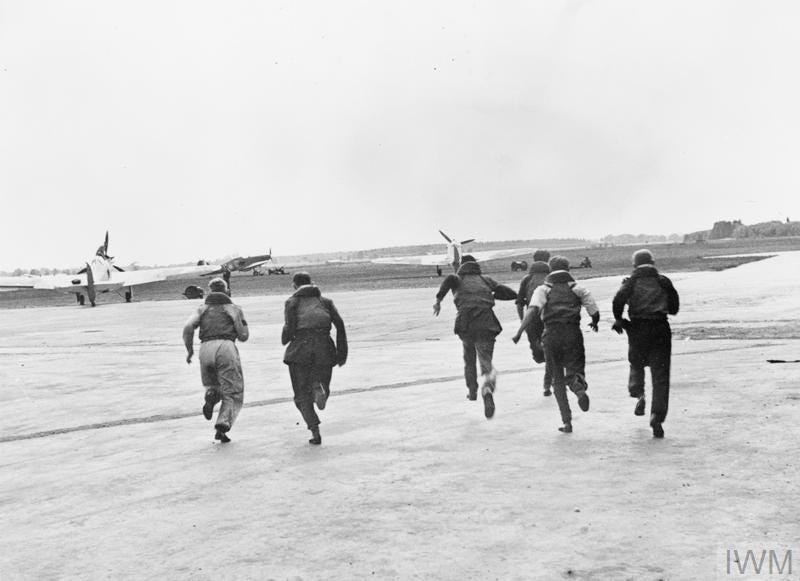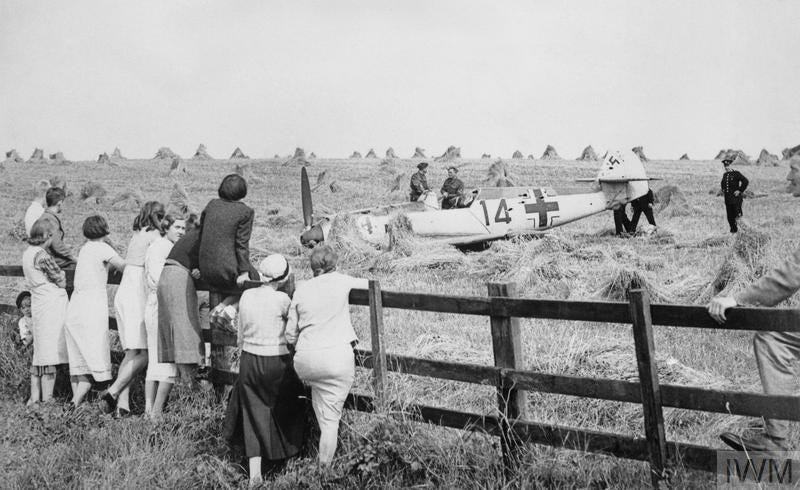The Battle of Britain Began This Day
"For a thousand years, men will still say, ‘This was their finest hour.’”
Eighty-three years ago this July 10, Nazi Germany launched a series of bombing raids on British ships and southern port cities, marking the start of the Battle of Britain–a months-long aircraft battle between the Luftwaffe against the the Royal Air Force (RAF). The battle followed the fall of France, and marked the first time a nation successfully resisted Nazi aggression.
By July 1940, Nazi Germany’s armies had overrun much of Europe, and Paris had fallen the month before. The rest of Europe—including the Soviet Union—was allied with Germany, and only a few neutral nations stood on the sidelines. Britain remained the last obstacle in Adolf Hitler’s path to Western European victory.
Journalist watching for Nazi aircraft from the roof of their Fleet Street newspaper office. Imperial War Museum.
Britain was blessed with three major advantages that could stop any attempted German invasion. First, the English Channel formed a significant moat around the island. Second, these waters were patrolled by the Royal Navy, which German naval forces couldn’t hope to meet in open battle. Finally: Britain was blessed with Winston Churchill, who rallied the nation behind him.
Hitler was left with one option: using the Luftwaffe to clear the sky of British planes–and then the Channel of British ships–to prepare the way for a German landing. Failing that, he planned to bomb Britain into submission and force a surrender.
The German campaign began by targeting British shipping and ports, and moved to focusing on RAF airfields before finally concentrating efforts on bombing civilians in London, Coventry, and other major British cities.
Hurricane pilots scrambling to their planes in the first month of the battle. Ministry of Information/Second World War Press Agency Print Collection/Imperial War Museum.
Though the battle started with Britain outnumbered by Germany, Britain still enjoyed several advantages, including its top-quality fighter planes, the Spitfire and Hurricane, which were more than capable of meeting their German counterparts in battle.
In the cockpits of those planes were skilled pilots who faced immense pressure and repeatedly risked their lives to defend their homeland. Winston Churchill immortalized these brave men in one of his most famous speeches, saying: “The gratitude of every home . . . goes out to the British airmen who, undaunted by odds, unwearied in their constant challenge and mortal danger, are turning the tide of the world war by their prowess and by their devotion. Never in the field of human conflict was so much owed by so many to so few.”
And though the majority of the airmen were British, many came from overseas, including from Nazi-occupied Europe. One of the most brilliant aces during the battle was a Czech pilot, and the Polish No. 303 Fighter Squadron became one of the most successful RAF fighter formations, with more than 100 kills.
Besides the excellent pilots and planes, the British also enjoyed a home field advantage. “German planes over Britain faced worries over fuel shortages,” military historian Victor Davis Hanson writes. “British fighters had more time for interception and dogfighting, and pilots could bail out over friendly territory. British airfields were better developed and perhaps more likely to be paved than German runways in many forward bases of occupied France, which were often makeshift dirt, grass, and gravel.”
A Heinkel He 111 bomber flying over the Isle of Dogs, September 1940. Air Ministry Second World War Official Collection/Imperial War Museum.
The British augmented these advantages by relying on the excellent Dowding System, pioneered by RAF Air Chief Marshal Sir Hugh Dowding. This system gathered information from radar stations and ground observers about incoming German attacks and then sent that information to British fighter squadrons so they could mobilize quickly to meet the enemy in the air.
Britain’s refusal to be cowed by the German bombardment, the courage and skill of Britain’s fighter pilots, the technical superiority of its Spitfires and Hurricanes, the organizational brilliance of the Dowding System, and Winston Churchill’s fearless leadership all combined to inflict heavy, unsustainable losses on the Luftwaffe and gain the skies for Britain.
A downed Messerschmitt at Mays Farm in Sussex, Aug. 12, 1940. Ministry of Information/Second World War Press Agency Print Collection/Imperial War Museum.
By September 1940, Hitler finally decided to postpone Operation Sealion, his planned invasion of Britain. Though some historians consider October 31, 1940—the day of the last daytime German bombing of Britain—the end of the Battle of Britain, German night-time attacks (“the Blitz”) continued until June 1941. Roughly 40,000 British civilians died to German bombs, more than five times the total American death toll after 20 years of war in Iraq and Afghanistan.
But though the victory was dearly bought it was a victory nonetheless. Hitler’s failure to cow Britain meant he turned his eyes eastwards to Moscow, the only remaining European power that could pose a threat to him, launching his infamous invasion of the Soviet Union that played a prime factor in his downfall. Britain remained in the fight, eventually acting as the springboard for the invasion and liberation of Nazi-occupied Europe, and played a major role in bringing down the Third Reich—thanks to the resilience of the British people, the leadership of Winston Churchill, and the courage of Britain’s service members in the army, navy and air force.
The iconic photograph St Paul’s Survives by The Daily Mail’s Herbert Mason. Imperial War Museum.
“Hitler knows that he will have to break us in this Island or lose the war,” Churchill said in a famous speech setting the stakes before the Battle of Britain. “If we can stand up to him, all Europe may be free and the life of the world may move forward into broad, sunlit uplands. . . . Let us therefore brace ourselves to our duties, and so bear ourselves that, if the British Empire and its Commonwealth last for a thousand years, men will still say, ‘This was their finest hour.’”
Only 83 years, not a thousand, have passed, but Churchill’s judgment has proven correct. Britain held the line against Nazi Germany when no one else could, in what indeed was their finest hour.









